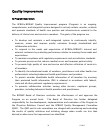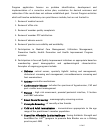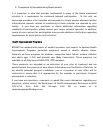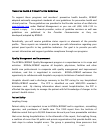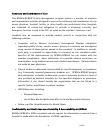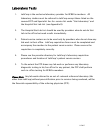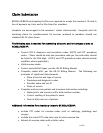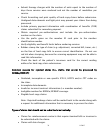
33 11/2005
have been found to decrease and/or prevent hospital errors. These three processes or
leaps
1
include:
• Computer Physician Order Entry (CPOE) hospitals that fulfill this standard will
(1) require physicians to enter medication orders via a computer linked to
prescribing error-prevention software; (2) demonstrate that their CPOE system
intercepted at least 50 percent of common serious prescribing errors, by using
a testing protocol specified by First Consulting Group and the Institute for Safe
Medication Practices; and (3) require documented acknowledgement by the
prescribing physician of the interception prior to an override.
• ICU Physician Staffing (IPS) hospitals that operate adult general medical/surgical
ICUs will ensure that all ICU patients are managed or co-managed by physicians
certified (or eligible for certification) in critical care medicine who: (1) are
present during daytime hours a minimum of eight hours per day, seven days a
week and, during this time, provide clinical care exclusively in the ICU; and (2)
at other times, return more than 95 percent of ICU pages (excluding low-
urgency pages, if the paging system can designate low-urgency pages) within
five minutes, and rely on a physician or FCCS-certified-3 non physician
"effector" who is in the hospital and able to reach ICU patients within five
minutes in more than 95 percent of cases. In geographical areas where
scientifically rigorous risk-adjusted ICU outcome comparisons are publicly
reported, favorable risk-adjusted outcomes will replace the ICU staffing
standard. If a hospital has no licensed or staffed adult general medical/surgical
ICU beds, then this standard does not apply.
• Evidence-based Hospital Referral (EHR) for seven elective treatments:
o Coronary artery bypass
o Coronary angioplasty
o Abdominal aortic aneurysm repair
o Carotid endarterectomy
o Esophageal cancer surgery
o Delivery with expected birth weight <1500 grams or gestational age <32
weeks
1
http://www.leapfroggroup.org/safety.htm







